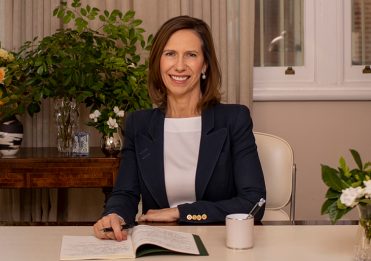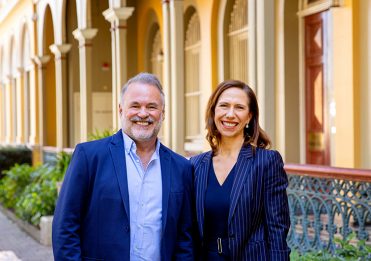Reflecting on Australia’s relationship to the world today, it is evident that the majority of young Australians, and certainly, Grammar girls, do not suffer from a sense of global isolation or cultural cringe. With its tremendous connecting power, the Internet allows us to converse and collaborate with people around the world. Added to this, Australians are renowned as great travellers—perhaps spurred by a sense of our geographical, rather than cultural, remoteness to explore and understand cultures distinctly different to our own.
As educators, we draw on and engage with the research and practice of colleagues around the world. During a period of Sabbatical Leave in Term 2 this year, I spent time focusing on reading, gaining new insights through exposure to different experiences in other countries—including Spain, the UK and Denmark—and articulating strategic priorities for the next stage in the School’s development.
In Spain, before setting off on a section of the Camino de Santiago, a network of pilgrims’ paths dating back to the Middle Ages, I spent time in Madrid. The grandeur of the public architecture and the country’s powerful history—with its rises and falls, proud moments and failures—prompted me to reflect on our relative immaturity as a colonised nation. While never forgetting an indigenous culture dating back at least 60 000 years, how do Australia’s colonial and post-colonial histories intersect and intertwine with ‘older’ nations’ histories? What do we have to offer to each other as nations, and how does our identity, difficult as it sometimes is to define, affect our perspective on a global stage? Most importantly, what does this mean for Brisbane Girls Grammar School and our students’ sense of place in the world?
At Cambridge, I completed a short course, ‘Transforming Society’, which looked at the intersection of economic theory, political ideology and social policy in Britain since the time of Margaret Thatcher. It was energising to be immersed, however briefly, in the issues and challenges of a nation facing a significant crossroads in its political and cultural composition. There were some particularly heated discussions, as more local participants wrestled with the sobering realities of a post-Brexit Britain.
It is exactly these kinds of conversations, about the most pressing, complex issues facing our world, through which the staff of Brisbane Girls Grammar School prepare our students to think from multiple, often antithetical, perspectives. Later this year, Girls Grammar students will join with others from China, Singapore, South Korea and Indonesia as the School hosts the 10th International Youth Leadership Forum. The delegates will brainstorm and debate the topic of Shared Futures, reflecting on practical ways to create a more positive world. These young people will experience first-hand the value of collaboration and visualisation, as they use ‘design thinking’ processes to construct a hypothetical future, which is fair, healthy, ethical and renewable.
Given the dramatic cultural, political and economic shifts Australia has seen since Blainey’s treatise, we look toward the future with optimistic anticipation. In all of their pursuits, from the classroom to the sporting field and, beyond secondary school through to their workplaces and personal lives, we encourage our students to do their part in removing ‘distance’. We hope Grammar girls will continue to seek understanding and mutual respect among their peers, be proud of their abilities and achievements, and set their sights on contributing to their local and global communities.
Understanding themselves and their identity allows students to feel confident and self-assured, while learning about and genuinely connecting to people and places from around the world allows them to develop understanding, open-mindedness and the optimism that is so essential to becoming mature and engaged global citizens. As another cohort approaches their graduation, with Valedictory Dinner and Speech Day nearly upon us, I look forward to seeing how these young women explore and assert their unique place in the world.
Ms Jacinda Euler
Principal



